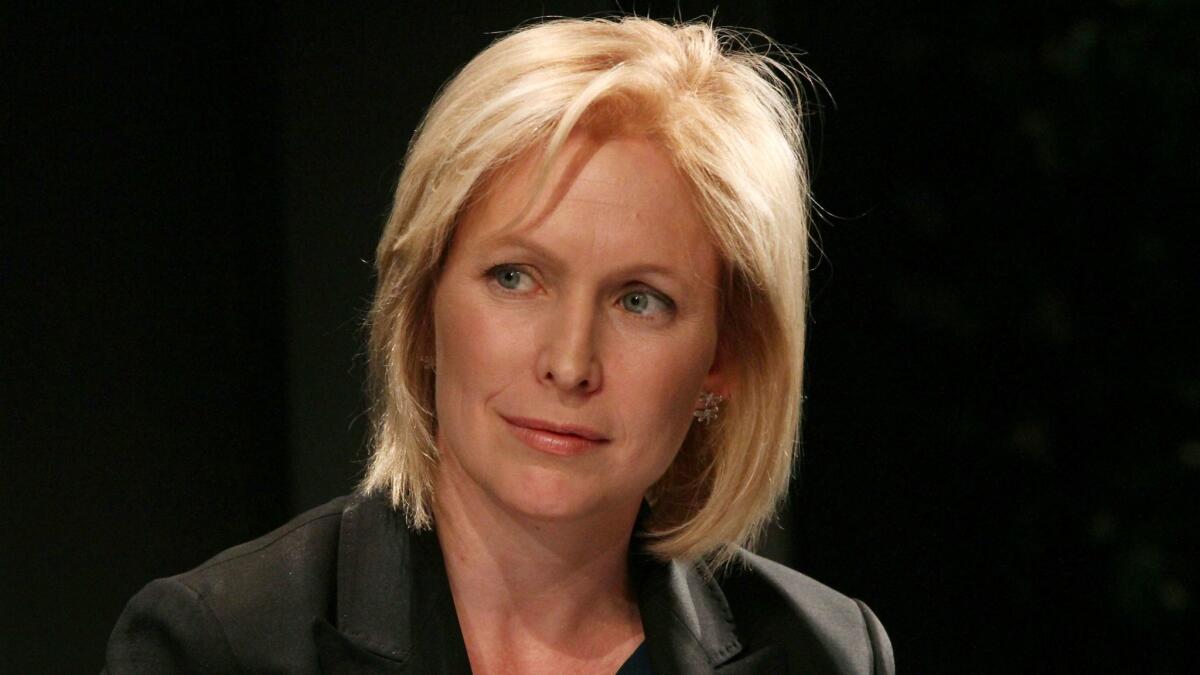Who is Kirsten Gillibrand? New York’s junior senator takes on Trump

- Share via
Reporting from New York — If Kirsten Gillibrand wasn’t already a household name, a Twitter war with President Trump earlier this month may have made her one.
It started when the 51-year-old junior senator from New York denounced Trump’s support for Senate candidate Roy Moore as “shameful” and said the president should resign.
Trump lashed back, saying Gillibrand used to come to his office “begging” for campaign contributions and “would do anything” for them.
Calling that a “sexist smear,” she shot back: “You cannot silence me or the millions of women who have gotten off the sidelines to speak out about the unfitness and shame you have brought to the Oval Office.”
The exchange was great publicity for a politician who is considered a possible candidate in the 2020 Democratic presidential primary.
Gillibrand has said she is focused on running for reelection in the Senate and not for the White House. But if Democrats are looking for someone with anti-Trump credentials, she fits the bill.
Born into politics
Her grandmother was a confidante of longtime Albany Mayor Erastus Corning and president of the Albany County Democratic Women’s Club, and her father was a well-known lobbyist.
Gillibrand attended Dartmouth College and UCLA Law School, graduating in 1991. She joined the Manhattan law firm Davis Polk & Wardwell and later worked as special counsel to then-Secretary of Housing and Urban Development Andrew Cuomo. She is married and has two sons.
Gillibrand volunteered for Hillary Clinton’s 2000 Senate campaign and has often described her as a role model.
“In my adult life, politically, no one has inspired me to get off the sidelines and truly make a difference more than Hillary Clinton has,” she wrote in a post on Medium in 2016 explaining why she was supporting Clinton for president.
Both Hillary and Bill Clinton supported Gillibrand in her successful 2006 bid for a seat in the U.S. House representing the upstate, largely rural 20th District of New York.
Starting out as a conservative Democrat
In the House, Gillibrand was a member of the so-called Blue Dog Democrats, a coalition of moderate to conservative Democrats. She opposed strict gun control, famously stating that she and her husband kept two rifles under their bed, and voted against policies that were seen as offering any sort of “amnesty” for immigrants who were in the U.S. illegally.
She earned a reputation for transparency, posting records of her daily meetings, earmarks and personal financial disclosures online. And she became one of only a handful of women to give birth during her congressional tenure.
In 2009, when Hillary Clinton vacated her U.S. Senate seat to become secretary of State under President Obama, New York’s then-Gov. David Paterson appointed Gillibrand, who was still largely unknown outside of upstate New York, to replace her.
Moving left in the Senate
Gillibrand has moved left since joining the Senate, reversing some of her earlier positions. She supported gun control and co-sponsored a version of the “Dream Act,” which would have provided a path to legal status for immigrants brought to the U.S. as children. She earned wide recognition for securing bipartisan support for legislation that ensured permanent healthcare and compensation for Sept. 11, 2001, first responders.
Gillibrand also made a name for herself on military issues and sexual assault. She worked to repeal the “don’t ask, don’t tell” policy banning gay people from openly serving, introduced the Military Justice Improvement Act to remove the decision of whether to prosecute sexual assault cases from the military chain of command, and co-sponsored the Campus Accountability and Safety Act requiring colleges and universities to meet certain standards for training and reporting around sexual assault.
Taking on Trump and sexual harassment on Capitol Hill
In 2017, Gillibrand elevated her national profile by taking bold public stances against Trump. She amassed a record of consistent “no” votes on the president’s nominees to appointed positions and spoke out against his executive order banning travel to the U.S. by immigrants from majority-Muslim nations.
As public attention has turned to allegations about sexual misconduct, Gillibrand has been out front calling for the resignations of politicians who have been accused. She has also introduced legislation to overhaul policies for reporting and combating sexual harassment on Capitol Hill.
“This moment of reckoning about our friends and colleagues who have been accused of sexual misconduct is necessary, and it is painful,” she wrote in a Dec. 6 Facebook post calling on Sen. Al Franken (D-Minn.) to step down. He did so the next day.
In an interview with the New York Times, Gillibrand said she thought President Clinton should have resigned when his affair with Monica Lewinsky came to light, provoking a collective gasp within the Democratic establishment.
Philippe Reines, a past advisor to Hillary Clinton, called Gillibrand a “hypocrite” on Twitter. “Over 20 yrs you took the Clintons’ endorsements, money, and seat,” he wrote. “Interesting strategy for 2020 primaries. Best of luck.”
In an interview on MSNBC, Gillibrand called Reines’ response “ridiculous.”
“Bill Clinton did very important things for this country,” she said. “But my point is about this conversation we are having today, and that we need to have the highest standards for elected leaders.”
It was her recent fight with Trump on Twitter, though, that brought Gillibrand the most attention.
“Congress should investigate the multiple sexual harassment and assault allegations against him,” she wrote, provoking Trump’s fiery response.
It appears she had the final word, at least in this battle.
Her last message — telling the president he could not silence her — was retweeted 150,000 times, more than sixfold as many times as Trump’s.
Twitter: @AgrawalNina
More to Read
Sign up for Essential California
The most important California stories and recommendations in your inbox every morning.
You may occasionally receive promotional content from the Los Angeles Times.











